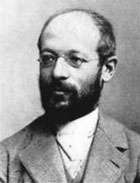Georg Simmel
(March 1, 1858 - September 28, 1918)

Georg Simmelwas born the youngest of seven children onMarch 1, 1858 inBerlin. His father was a prosperous Jewish businessman who had converted to Christianity and died when Georg was still young. His mother was domineering and distant, leading young Georg to lack a strong family foundation. Simmel studied at the University of Berlin and received his doctorate in 1881. His knowledge spanned the fields of history, philosophy, psychology and the social sciences. In 1885 he became an unpaid lecturer at the University of Berlin, teaching courses on logic and the history of philosophy, ethics, social psychology, and sociology. In 1890 Simmel married a woman named Gertud, who was a philosopher that published under the pseudonym Marie-Luise Enckendorf. In 1903, the University of Berlin granted Simmel an honorary title that put him a step above unpaid lecturer but still kept him from taking part in the affairs of the academic community.Simmel was well regarded as a brilliant man with an extraordinary talent in lecturing. It is ironic that when Simmel finally received a full professorship at the University of Strasbourg in 1914 he was deprived of almost every opportunity to lecture to students as the lecture halls were converted to military hospitals due to the outbreak of war. Simmel died of cancer of the liver on September 28, 1918, shortly before the end of the war.Simmel was a very prolific writer, with more than two hundred articles to his name. He also wrote around 20 books in the fields of philosophy, ethics, sociology and cultural criticism. Despite his numerous publications, Simmel did not develop a consistent body of knowledge or theory and therefore did not succeed in creating a "school" of thought. Simmel's main contribution to sociology was his self-conscious attempt to reject theorganicist theories of Comte and Spencer. Simmel advanced that society consists of a web of multiple relations between individuals who are in constant interaction with one another.
Some of his Major Works:
On Social Differentiation(1890)
The Problems of the Philosophy of History(1893)
Introduction to the Science of Ethics(1893)
The Philosophy of Money(1900)
Fundamental Questions of Sociology(1917)
Taken from:
http://sobek.colorado.edu/SOC/SI/si-simmel-bio.htmAlso see:
http://socio.ch/sim/bio.htm
http://www.mala.bc.ca/~mcneil/simmel.htm
http://www.cf.ac.uk/socsi/undergraduate/introsoc/simmel.html
http://www.bolender.com/Dr.%20Ron/SOC4044%20Sociological%20Theory/ Class%20Sessions/Sociological%20Theory/Simmel%2C%20Georg/simmel%2C_georg.htm
http://uregina.ca/~gingrich/simmel.htm
http://en.wikipedia.org/wiki/Georg_Simmel